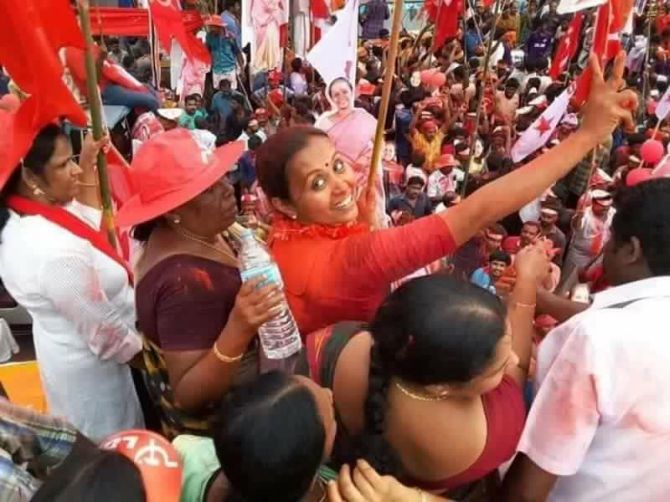Rampant corruption by Congress ministers must be counted as the single biggest factor to prompt the electorate to hand over a thumping mandate to the Communist parties, says M K Bhadrakumar.

The Left Democratic Front led by the Communist parties has stormed into power in the state assembly election in Kerala, winning 91 seats out of a total of 140 seats, securing almost a two-thirds majority.
The United Democratic Front led by the Congress party has suffered a humiliating defeat, with several incumbent ministers losing their seats to LDF candidates. Many staunch Congress fortresses have been breached by the Communists.
What accounts for the stunning victory by the Communists? An easy explanation will be that the electorate has stuck to the set decades-long habit of alternatively choosing the LDF and UDF with an impeccable regularity.
Put differently, the 'anti-incumbency' factor has been at work, once again. However, that will be a facile reading. The point is, there are sub-plots, and some of them could be even more important than the main plot of 'anti-incumbency' -- the single most important thing being the compelling reality that electoral politics in Kerala is no longer 'bipolar' (UDF versus LDF).
Without doubt, the Bharatiya Janata Party has gained traction in state politics and the fact that it secured one seat in the state assembly for the first time is being duly noted as a watershed event which, unsurprisingly, draws national attention.
However, what is beneath the radar is that in several seats, BJP candidates put up a strong performance, coming second in many of them. In the Manjeswaram constituency in the Malabar region, a prominent BJP leader narrowly lost by only 89 votes.
The BJP candidates have attracted voters all across the state. The party's main plank -- the imperative need of a 'Third Front', or better still, a 'Third Way' -- has been found appealing by a growing number of people who seek 'change'.
Nonetheless, a tantalising question also arises: Can it be that the BJP has 'peaked' in Kerala politics? The party's future prospects will critically depend on its ability to attract allies.
But, as things stand, the demography of the state -- with Hindus accounting for only half of the population -- works against the BJP attracting allies, unless it is willing to jettison its Hindutva ideology, which is improbable.
To compound the problem, the Rashtriya Swayamsevak Sangh provides the party's 'steel frame' in the state, with even the BJP president being its hand-picked nominee.
Second, 'anti-incumbency' cannot quite explain the vehement rejection of the UDF, especially the Congress party, by the electorate.
The rampant corruption by Congress ministers in the outgoing government became a liability for the entire UDF and must be counted as the single biggest factor to prompt the electorate to hand over a thumping mandate to the Communist parties.
Corruption is not a new phenomenon in Kerala's public life and in the popular exception, no party is above corruption. The people have resigned themselves to corruption as an inevitable part of party politics.
But the outgoing UDF government crossed all limits. The sleaze and the venality offended the public's sense of dignity and self-respect. The so-called ‘solar scam’ did incalculable damage to the credibility of the Congress ministers.
Thirdly, the LDF presented a unified leadership, setting aside the fratricidal strife and personality clashes that were a running feature in the recent years, which in turn enabled it to mount an effective campaign.
The Congress party, on the contrary, looked a house divided, and the virtual standoff for a week in broad daylight over the selection of candidates between Chief Minister Oommen Chandy and the state party leadership under V M Sudheeran -- the latter supported by Rahul Gandhi -- became first-rate political theatre and seriously dented the party's image.
In retrospect, Sudheeran and Rahul Gandhi's line stands fully vindicated -- namely, all tainted ministers should have stood down and new faces should have been brought in so that the Congress could have aspired to project a 'clean break' from the past.
For some inexplicable reason, though, the party's high command in Delhi caved in after Chandy threatened non-cooperation unless his entire cabinet team was allowed to seek a fresh mandate.
This has proved to be a cardinal error, because Chandy was more the problem than the solution and a splendid opportunity to marginalise him and his faction was allowed to pass.
Without doubt, the Congress in Kerala today faces the biggest-ever electoral setback in the state's history of coalition politics, and Chandy will have to pay the ultimate price for it.
The course correction and restructuring that lie ahead are not going to be easy, since the Congress is also ridden with factionalism. Over and above, the debacle in Kerala only reinforces the BJP's narrative of an India that is getting rid of the Congress party.
Finally, most importantly, it cannot be overlooked that the politics on caste and communal lines surged as a strong undercurrent in the present election like never before in Kerala. It has ended up working in favour of the LDF -- although no political parties, especially the Communists, will ever be willing to acknowledge caste-based politics. This needs some explanation.
For a start, the BJP's innovative project to put together a 'rainbow coalition' -- comprising the two main Hindu castes (Nairs and Ezhavas) plus Dalits, with a sprinkling of Christian and Muslim minority time-servers thrown in -- didn't quite work the way it was intended to.
While there has been a significant erosion of the Congress's Nair electoral base -- which explains the BJP's surge in Thiruvananthapuram city, for example -- the project to entice the Ezhavas (who account for 25 percent of the state's population and traditionally formed the foot soldiers of the Left) into the 'rainbow coalition' largely floundered.
The election results suggest that the Communist parties have won a stunning victory in the entire 'Ezhava belt' in southern Kerala -- winning 29 seats out of 33 seats.
On the other hand, the spectre of a BJP surge in the state may have prompted sections of the minority communities (who were traditionally the 'vote bank' for the UDF), to view the Communist parties in a new light as the only credible and committed political force available today to resist the tide of communal polarisation.
Of course, the Congress party -- and Chandy himself -- has only itself to blame for the perception that gained ground among the minority communities that it has an ambivalent stance vis-a-vis the BJP.
At any rate, thanks to the new thinking in the minority communities, the LDF has won exceedingly well in Trichur, Kozhikode and Idukki districts.
Even the citadel of the Muslim League in Malappuram in the Malabar region has become shaky for the first time, with the Left making electoral inroads most unexpectedly.
There has been a notion so far that the Communist parties in Kerala are quintessentially 'Hindu parties.' Therefore, the LDF's success in attracting the minority communities to its fold possibly holds far-reaching implications for the alignment of forces in Kerala politics.
Paradoxically, the LDF has secured a challenging mandate. From day 1, the BJP can be trusted to mount a no-holds-barred political offensive. It has tasted blood and is raring to go.
It is the ruling party at the Centre and make no mistake that the RSS -- and Prime Minister Narendra Modi himself -- targets Kerala as a potentially rewarding hunting ground.
Suffice to say, from now onwards, the BJP can only gain from eclipsing the UDF as the flag-carrier of the opposition to the Communist parties.
Indeed, any unravelling of the UDF under the trauma of the devastating electoral defeat can only work to the BJP's advantage.
On the national plane, the LDF victory in Kerala is critically important for the Communist parties, too, if only to stay afloat at least as a peripheral force in India's electoral politics.
The sweet victory in Kerala mitigates to a great extent the humiliating rout the Left has suffered concurrently in the state election in West Bengal.
But if there is a lesson to be learnt from the West Bengal experience, it is that once the Communist parties lose their ideological moorings and disorientation sets in, it will be very difficult to stem the downward slide, leave alone reverse the erosion of mass support that ensues.
The 'pro-poor' image of the Communist parties in Kerala has served them well so far. But, then, Kerala is also transforming rapidly as a middle-class society.
Expectations have been raised about a new development agenda, especially among the youth.
The big question hovers around the LDF government's ability and ingenuity to make the tricky transition that becomes necessary in sync with the zeitgeist. Much depends on the leadership of the new LDF government.
Ambassador M K Bhadrakumar, one of India's most erudite diplomats, blogs at https://blogs.rediff.com/mkbhadrakumar/











 © 2025
© 2025